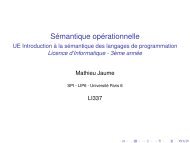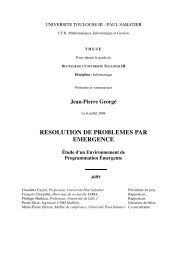The SmPL Grammar (version 1.0.0-rc18 ) - Coccinelle - LIP6
The SmPL Grammar (version 1.0.0-rc18 ) - Coccinelle - LIP6
The SmPL Grammar (version 1.0.0-rc18 ) - Coccinelle - LIP6
- No tags were found...
Create successful ePaper yourself
Turn your PDF publications into a flip-book with our unique Google optimized e-Paper software.
<strong>The</strong> <strong>SmPL</strong> <strong>Grammar</strong> (<strong>version</strong> <strong>1.0.0</strong>-rc23 )Research group on <strong>Coccinelle</strong>December 10, 2014This document presents the grammar of the <strong>SmPL</strong> language used by the <strong>Coccinelle</strong> tool. For the most part, thegrammar is written using standard notation. In some rules, however, the left-hand side is in all uppercase letters.<strong>The</strong>se are macros, which take one or more grammar rule right-hand-sides as arguments. <strong>The</strong> grammar also uses someunspecified nonterminals, such as id, const, etc. <strong>The</strong>se refer to the sets suggested by the name, i.e., id refers to the setof possible C-language identifiers, while const refers to the set of possible C-language constants.A square bracket that is surrounded by spaces in the description of a term should appear explicitly in the term, asin an array reference. On the other hand, square brackets that surround some other term indicat that the presence ofthat term is optional.A HTML <strong>version</strong> of this documentation is available online at http://coccinelle.lip6.fr/docs/main_grammar.html.1 Programprogram ::= include_cocci ∗ changeset +include_cocci ::= include string| using string| using pathToIsoFile| virtual id (, id) ∗changeset ::= metavariables transformation| script_metavariables script_codescript_code is any code in the chosen scripting language. Parsing of the semantic patch does not check the validityof this code; any errors are first detected when the code is executed. Furthermore, @ should not be use in this code.Spatch scans the script code for the next @ and considers that to be the beginning of the next rule, even if @ occurswithin e.g., a comment.virtual keyword is used to declare virtual rules. Virtual rules may be subsequently used as a dependency forthe rules in the <strong>SmPL</strong> file. Whether a virtual rule is defined or not is controlled by the -D option on the command line.2 Metavariables for transformations<strong>The</strong> rulename portion of the metavariable declaration can specify properties of a rule such as its name, the names ofthe rules that it depends on, the isomorphisms to be used in processing the rule, and whether quantification over pathsshould be universal or existential. <strong>The</strong> optional annotation expression indicates that the pattern is to be consideredas matching an expression, and thus can be used to avoid some parsing problems.<strong>The</strong> metadecl portion of the metavariable declaration defines various types of metavariables that will be used formatching in the transformation section.1
metavariables ::= @@ metadecl ∗ @@| @ rulename @ metadecl ∗ @@rulename ::= id [extends id] [depends on dep] [iso] [disable-iso] [exists] [expression]dep ::= id| !id| !(dep)| ever id| never id| dep && dep| dep || dep| (dep)iso ::= using string (, string) ∗disable-iso ::= disable COMMA_LIST(id)exists ::= exists| forallCOMMA_LIST(elem) ::= elem (, elem) ∗<strong>The</strong> keyword disable is normally used with the names of isomorphisms defined in standard.iso or whateverisomorphism file has been included. <strong>The</strong>re are, however, some other isomorphisms that are built into the implementationof <strong>Coccinelle</strong> and that can be disabled as well. <strong>The</strong>ir names are given below. In each case, the text describes thestandard behavior. Using disable-iso with the given name disables this behavior.• optional_storage: A <strong>SmPL</strong> function definition that does not specify any visibility (i.e., static or extern),or a <strong>SmPL</strong> variable declaration that does not specify any storage (i.e., auto, static, register, or extern), matches afunction declaration or variable declaration with any visibility or storage, respectively.• optional_qualifier: This is similar to optional_storage, except that here is it the qualifier (i.e.,const or volatile) that does not have to be specified in the <strong>SmPL</strong> code, but may be present in the C code.• optional_attributes: This is similar to optional_attributes, except that here is it an attribute(e.g., __init) that does not have to be specified in the <strong>SmPL</strong> code, but may be present in the C code. Notethat this isomorphism is currently useless, because matching of attributes is not supported, due to thedifficulty of parsing attributes in C code.• value_format: Integers in various formats, e.g., 1 and 0x1, are considered to be equivalent in the matchingprocess.• optional_declarer_semicolon: Some declarers (top-level terms that look like function calls but serveto declare some variable) don’t require a semicolon. This isomorphism allows a <strong>SmPL</strong> declarer with a semicolonto match such a C declarer, if no transformation is specified on the <strong>SmPL</strong> semicolon.• comm_assoc: An expression of the form exp bin_op ..., where bin_op is commutative and associative, isconsidered to match any top-level sequence of bin_op operators containing exp as the top-level argument.<strong>The</strong> possible types of metavariable declarations are defined by the grammar rule below. Metavariables shouldoccur at least once in the transformation immediately following their declaration. Fresh identifier metavariables mustonly be used in + code. <strong>The</strong>se properties are not expressed in the grammar, but are checked by a subsequent analysis.<strong>The</strong> metavariables are designated according to the kind of terms they can match, such as a statement, an identifier, oran expression. An expression metavariable can be further constrained by its type. A declaration metavariable matchesthe declaration of one or more variables, all sharing the same type specification (e.g., int a,b,c=3;). A fieldmetavariable does the same, but for structure fields.2
metadecl ::= metavariable ids ;| fresh identifier ids ;| identifier COMMA_LIST(pmid_with_regexp) ;| identifier COMMA_LIST(pmid_with_virt_or_not_eq) ;| parameter [list] ids ;| parameter list [ id ] ids ;| parameter list [ const ] ids ;| type ids ;| statement [list] ids ;| declaration ids ;| field [list] ids ;| typedef ids ;| attribute ids ;| declarer name ids ;| declarer COMMA_LIST(pmid_with_regexp) ;| declarer COMMA_LIST(pmid_with_not_eq) ;| iterator name ids ;| iterator COMMA_LIST(pmid_with_regexp) ;| iterator COMMA_LIST(pmid_with_not_eq) ;| [local] idexpression [ctype] COMMA_LIST(pmid_with_not_eq) ;| [local] idexpression [{ctypes} * ∗ ] COMMA_LIST(pmid_with_not_eq) ;| [local] idexpression * + COMMA_LIST(pmid_with_not_eq) ;| expression list ids ;| expression * + COMMA_LIST(pmid_with_not_eq) ;| expression enum * ∗ COMMA_LIST(pmid_with_not_eq) ;| expression struct * ∗ COMMA_LIST(pmid_with_not_eq) ;| expression union * ∗ COMMA_LIST(pmid_with_not_eq) ;| expression COMMA_LIST(pmid_with_not_ceq) ;| expression list [ id ] ids ;| expression list [ const ] ids ;| ctype [ ] COMMA_LIST(pmid_with_not_eq) ;| ctype COMMA_LIST(pmid_with_not_ceq) ;| {ctypes} * ∗ COMMA_LIST(pmid_with_not_ceq) ;| {ctypes} * ∗ [ ] COMMA_LIST(pmid_with_not_eq) ;| constant [ctype] COMMA_LIST(pmid_with_not_eq) ;| constant [{ctypes} * ∗ ] COMMA_LIST(pmid_with_not_eq) ;| position [any] COMMA_LIST(pmid_with_not_eq_mid) ;| symbol ids;| format ids;| format list [ id ] ids ;| format list [ const ] ids ;A metavariable declaration local idexpression v means that v is restricted to be a local variable. If it should just bea variable, but not necessarily a local one, then drop local. A more complex description of a location, such as a->b isconsidered to be an expression, not an ideexpression.Constant is for constants, such as 27. But it also considers an identifier that is all capital letters (possibly containingnumbers) as a constant as well, because the names gives to macros in Linux usually have this form.An identifier is the name of a structure field, a macro, a function, or a variable. Is is the name of something ratherthan an expression that has a value. But an identifier can be used in the position of an expression as well, where itrepresents a variable.It is possible to specify that an expression list or a parameter list metavariable should match a specific number ofexpressions or parameters.3
It is possible to specify some information about the definition of a fresh identifier. See the wiki.A symbol declaration specifies that the provided identifiers should be considered C identifiers when encounteredin the body of the rule. Identifiers in the body of the rule that are not declared explicitly are by default consideredsymbols, thus symbol declarations are optional.An attribute declaration indicates a name that should be considered to be an attribute. It is not possible to match orremove an attribute, only to add one.A position metavariable is used by attaching it using @ to any token, including another metavariable. Its valueis the position (file, line number, etc.) of the code matched by the token. It is also possible to attach expression,declaration, type, initialiser, and statement metavariables in this manner. In that case, the metavariable is bound to theclosest enclosing expression, declaration, etc. If such a metavariable is itself followed by a position metavariable, theposition metavariable applies to the metavariable that it follows, and not to the attached token. This makes it possibleto get eg the starting and ending position of f(...), by writing f(...)@E@p, for expression metavariable E andposition metavariable p.When used, a format or format list metavariable must be enclosed by a pair of @s. A format metavariable matchesthe format descriptor part, i.e., 2x in %2x. A format list metavariable matches a sequence of format descriptors aswell as the text between them. Any text around them is matched as well, if it is not matched by the surrounding textin the semantic patch. Such text is not partially matched. If the length of the format list is specified, that indicatesthe number of matched format descriptors. It is also possible to use ... in a format string, to match a sequence oftext fragments and format descriptors. This only takes effect if the format string contains format descriptors. Notethat this makes it impossible to require ... to match exactly in a string, if the semantic patch string contains formatdescriptors. If that is needed, some processing with a scripting language would be required. And example for the useof string format metavariables is found in demos/format.cocci.Other kinds of metavariables can also be attached using @ to any token. In this case, the metavariable floats up tothe enclosing appropriate expression. For example, 3 +@E 4, where E is an expression metavariable binds E to 3+ 4. A particular case is Ps@Es, where Ps is a parameter list and Es is an expression list. This pattern matches aparameter list, and then matches Es to the list of expressions, ie a possible argument list, represented by the names ofthe parameters.Matching of various kinds of format strings within strings is supported. With the -ibm option, matching ofdecimal format declarations is supported, but the length and precision arguments are not interpreted. Thus it is notpossible to match metavariables in these fields. Instead, the entire format is matched as a single string.ids ::= COMMA_LIST(pmid)pmid ::= id| midmid ::= rulename_id.idpmid_with_regexp ::= pmid =˜ regexp| pmid !˜ regexppmid_with_not_eq ::= pmid [!= id_or_meta]| pmid [!= { COMMA_LIST(id_or_meta) }]pmid_with_virt_or_not_eq ::= virtual.id| pmid_with_not_eqpmid_with_not_ceq ::= pmid [!= id_or_cst]| pmid [!= { COMMA_LIST(id_or_cst) }]id_or_cst ::= id| integerid_or_meta ::= id| rulename_id.idpmid_with_not_eq_mid ::= pmid [!= mid]| pmid [!= { COMMA_LIST(mid) }]Subsequently, we refer to arbitrary metavariables as metaid ty , where ty indicates the metakind used in the declarationof the variable. For example, metaid Type refers to a metavariable that was declared using type and stands for4
any type.metavariable declares a metavariable for which the parser tried to figure out the metavariable type basedon the usage context. Such a metavariable must be used consistently. <strong>The</strong>se metavariables cannot be used in allcontexts; specifically, they cannot be used in context that would make the parsing ambiguous. Some examples are theleftmost term of an expression, such as the left-hand side of an assignment, or the type in a variable declaration. <strong>The</strong>serestrictions may seems somewhat arbitrary from the user’s point of view. Thus, it is better to use metavariables withmetavariable types. If <strong>Coccinelle</strong> is given the argument -parse_cocci, it will print information about the type thatis inferred for each metavariable.<strong>The</strong> ctype and ctypes nonterminals are used by both the grammar of metavariable declarations and the grammar oftransformations, and are defined on page 9.An identifier metavariable with virtual as its “rule name” is given a value on the command line. For example,if a semantic patch contains a rule that declares an identifier metavariable with the name virtual.alloc, thenthe command line could contain -D alloc=kmalloc. <strong>The</strong>re should not be space around the =. An example is indemos/vm.cocci and demos/vm.c.Warning: Each metavariable declaration causes the declared metavariables to be immediately usable, without anyinheritance indication. Thus the following are correct:@@type r.T;T x;@@[...] // some semantic patch code@@r.T x;type r.T;@@[...] // some semantic patch codeBut the following is not correct:@@type r.T;r.T x;@@[...] // some semantic patch codeThis applies to position variables, type metavariables, identifier metavariables that may be used in specifying astructure type, and metavariables used in the initialization of a fresh identifier. In the case of a structure type, anyidentifier metavariable indeed has to be declared as an identifier metavariable in advance. <strong>The</strong> syntax does not permitr.n as the name of a structure or union type in such a declaration.3 Metavariables for scriptsMetavariables for scripts can only be inherited from transformation rules. In the spirit of scripting languages such asPython that use dynamic typing, metavariables for scripts do not include type declarations.5
script_metavariables ::= @ script:language [rulename] [depends on dep] @ script_metadecl ∗ @@| @ initialize:language [depends on dep] @ script_virt_metadecl ∗ @@| @ finalize:language [depends on dep] @ script_virt_metadecl ∗ @@language ::= python| ocamlscript_metadecl ::= id
1 proc_info_func(...) {2 host_no5 ...>6 }1 proc_info_func(...) {2 5 }1 proc_info_func(...) {2 host_no4 ...>5 }Requiring that both slices parse correctly ensures that the rule matches syntactically valid C code and that it producessyntactically valid C code. <strong>The</strong> generated parse trees are then merged for use in the subsequent matching andtransformation process.<strong>The</strong> grammar for the minus or plus slice of a transformation is as follows:transformation ::= include +| OPTDOTSEQ(top, when)include ::= #include include_stringtop ::= expr| decl_stmt +| fundeclwhen ::= when != when_code| when = rule_elem_stmt| when COMMA_LIST(any_strict)| when true != expr| when false != exprwhen_code ::= OPTDOTSEQ(decl_stmt + , when)| OPTDOTSEQ(expr, when)rule_elem_stmt ::= one_decl| expr;| return [expr];| break;| continue;| \(rule_elem_stmt (\| rule_elem_stmt) + \)any_strict ::= any| strict| forall| existsOPTDOTSEQ(grammar_ds, when_ds) ::=[... (when_ds) ∗ ] grammar_ds (... (when_ds) ∗ grammar_ds) ∗ [... (when_ds) ∗ ]Lines may be annotated with an element of the set {-, +, *} or the singleton ?, or one of each set. ? represents at mostone match of the given pattern, ie a match of the pattern is optional. * is used for semantic match, i.e., a pattern thathighlights the fragments annotated with *, but does not perform any modification of the matched code. * cannot bemixed with - and +. <strong>The</strong>re are some constraints on the use of these annotations:• Dots, i.e. ..., cannot occur on a line marked +.7
• Nested dots, i.e., dots enclosed in < and >, cannot occur on a line with any marking.Each element of a disjunction must be a proper term like an expression, a statement, an identifier or a declaration.Thus, the rule on the left below is not a syntactically correct <strong>SmPL</strong> rule. One may use the rule on the right instead.1 @@2 type T;3 T b;4 @@56 (7 writeb(...,8 |9 readb(...,10 )11 -(T)12 b)1 @@2 type T;3 T b;4 @@56 (7 read8 |9 write10 )11 (...,12 - (T)13 b)Some kinds of terms can only appear in + code. <strong>The</strong>se include comments, ifdefs, and attributes (__attribute__((...))).8
5 Typesctypes ::= COMMA_LIST(ctype)ctype ::= [const_vol] generic_ctype * ∗| [const_vol] void * +| (ctype (| ctype) ∗ )const_vol ::= const| volatilegeneric_ctype ::= ctype_qualif| [ctype_qualif ] char| [ctype_qualif ] short| [ctype_qualif ] short int| [ctype_qualif ] int| [ctype_qualif ] long| [ctype_qualif ] long int| [ctype_qualif ] long long| [ctype_qualif ] long long int| double| long double| float| size_t| ssize_t| ptrdiff_t| enum id { PARAMSEQ(dot_expr, exp_whencode) [,] }| [struct| union] id [{ struct_decl_list ∗ }]ctype_qualif ::= unsigned| signedstruct_decl_list ::= struct_decl_list_startstruct_decl_list_start ::= struct_decl| struct_decl struct_decl_list_start| ... [when != struct_decl] † [continue_struct_decl_list]continue_struct_decl_list ::= struct_decl struct_decl_list_start| struct_declstruct_decl ::= ctype d_ident;| fn_ctype (* d_ident) (PARAMSEQ(name_opt_decl, ε));)| [const_vol] id d_ident;d_ident ::= id [[expr]] ∗fn_ctype ::= generic_ctype * ∗| void * ∗name_opt_decl ::= decl| ctype| fn_ctype† <strong>The</strong> optional when construct ends at the end of the line.9
6 Function declarationsfundecl ::= [fn_ctype] funinfo ∗ funid ([PARAMSEQ(param, ε)]) { [stmt_seq] }funproto ::= [fn_ctype] funinfo ∗ funid ([PARAMSEQ(param, ε)]);funinfo ::= inline| storagestorage ::= static| auto| register| externfunid ::= id| metaid Id| OR(stmt)param ::= type id| metaid Param| metaid ParamListdecl ::= ctype id| fn_ctype (* id) (PARAMSEQ(name_opt_decl, ε))| void| metaid ParamPARAMSEQ(gram_p, when_p) ::=COMMA_LIST(gram_p | ...[when_p])To match a function it is not necessary to provide all of the annotations that appear before the function name. Forexample, the following semantic patch:1 @@2 @@34 foo() { ... }matches a function declared as follows:1 static int foo() { return 12; }This behavior can be turned off by disabling the optional_storage isomorphism. If one adds code before afunction declaration, then the effect depends on the kind of code that is added. If the added code is a function definitionor CPP code, then the new code is placed before all information associated with the function definition, including anycomments preceding the function definition. On the other hand, if the new code is associated with the function, suchas the addition of the keyword static, the new code is placed exactly where it appears with respect to the rest of thefunction definition in the semantic patch. For example,1 @@2 @@34 + static5 foo() { ... }causes static to be placed just before the function name. <strong>The</strong> following causes it to be placed just before the type1 @@2 type T;3 @@45 + static6 T foo() { ... }10
It may be necessary to consider several cases to ensure that the added ode is placed in the right position. For example,one may need one pattern that considers that the function is declared inline and another that considers that it is not.<strong>The</strong> C parser allows functions that have no return type, and assumes that the return type is int. <strong>The</strong> support forparsing such functions is limited. In particular, the parameter list must contain a type for each parameter, and may notcontain varargs.7 Declarationsdecl_var ::= common_decl| [storage] ctype COMMA_LIST(d_ident) ;| [storage] [const_vol] id COMMA_LIST(d_ident) ;| [storage] fn_ctype ( * d_ident ) ( PARAMSEQ(name_opt_decl, ε) ) = initialize ;| typedef ctype typedef_ident ;one_decl ::= common_decl| [storage] ctype id;| [storage] [const_vol] id d_ident ;common_decl ::= ctype;| funproto| [storage] ctype d_ident = initialize ;| [storage] [const_vol] id d_ident = initialize ;| [storage] fn_ctype ( * d_ident ) ( PARAMSEQ(name_opt_decl, ε) ) ;| decl_ident ( [COMMA_LIST(expr)] ) ;initialize ::= dot_expr| metaid Initialiser| { [COMMA_LIST(init_list_elem)] }init_list_elem ::= dot_expr| designator = initialize| metaid Initialiser| metaid InitialiserList| id : dot_exprdesignator ::= . id| [ dot_expr ]| [ dot_expr ... dot_expr ]decl_ident ::= DeclarerId| metaid DeclarerAn initializer for a structure can be ordered or unordered. It is considered to be unordered if there is at least onekey-value pair initializer, e.g., .x = e.A declaration can have e.g. the form register x;. In this case, the variable implicitly has type int, and <strong>SmPL</strong>code that declares an int variable will match such a declaration. On the other hand, the implicit int type has no position.If the <strong>SmPL</strong> code tries to record the position of the type, the match will fail.8 Statements<strong>The</strong> first rule statement describes the various forms of a statement. <strong>The</strong> remaining rules implement the constraints thatare sensitive to the context in which the statement occurs: single_statement for a context in which only one statementis allowed, and decl_statement for a context in which a declaration, statement, or sequence thereof is allowed.11
stmt ::= directive| metaid Stmt| expr;| if (dot_expr) single_stmt [else single_stmt]| for ([dot_expr]; [dot_expr]; [dot_expr]) single_stmt| while (dot_expr) single_stmt| do single_stmt while (dot_expr);| iter_ident (dot_expr ∗ ) single_stmt| switch ([dot_expr]) {case_line ∗ }| return [dot_expr];| { [stmt_seq] }| NEST(decl_stmt + , when)| NEST(expr, when)| break;| continue;| id:| goto id;| {stmt_seq }directive ::= include| #define id [top]| #define id (PARAMSEQ(id, ε)) [top]| #undef id| #pragma id id +| #pragma id (PARAMSEQ(expr, ε))| #pragma id ...single_stmt ::= stmt| OR(stmt)decl_stmt ::= metaid StmtList| decl_var| stmt| OR(stmt_seq)stmt_seq ::= decl_stmt ∗ [DOTSEQ(decl_stmt + , when) decl_stmt ∗ ]| decl_stmt ∗ [DOTSEQ(expr, when) decl_stmt ∗ ]case_line ::= default : stmt_seq| case dot_expr : stmt_seqiter_ident ::= IteratorId| metaid IteratorOR(gram_o) ::= ( gram_o (|gram_o) ∗ )DOTSEQ(gram_d, when_d) ::= ...[when_d] (gram_d ...[when_d]) ∗NEST(gram_n, when_n) ::= | OR is a macro that generates a disjunction of patterns. <strong>The</strong> three tokens (, |, and ) must appear in the leftmost column,to differentiate them from the parentheses and bit-or tokens that can appear within expressions (and cannot appear inthe leftmost column). <strong>The</strong>se token may also be preceded by \ when they are used in an other column. <strong>The</strong>se tokensare furthermore different from (, |, and ), which are part of the grammar metalanguage.9 ExpressionsA nest or a single ellipsis is allowed in some expression contexts, and causes ambiguity in others. For example, ina sequence ...expr ..., the nonterminal expr must be instantiated as an explicit C-language expression, while12
in an array reference, expr 1 [ expr 2 ], the nonterminal expr 2 , because it is delimited by brackets, can be alsoinstantiated as ..., representing an arbitrary expression. To distinguish between the various possibilities, we definethree nonterminals for expressions: expr does not allow either top-level nests or ellipses, nest_expr allows a nest butnot an ellipsis, and dot_expr allows both. <strong>The</strong> EXPR macro is used to express these variants in a concise way.expr ::= EXPR(expr)nest_expr ::= EXPR(nest_expr)| NEST(nest_expr, exp_whencode)dot_expr ::= EXPR(dot_expr)| NEST(dot_expr, exp_whencode)| ... [exp_whencode]EXPR(exp) ::= exp assign_op exp| exp++| exp-| unary_op exp| exp bin_op exp| exp ? dot_expr : exp| (type) exp| exp [dot_expr]| exp . id| exp -> id| exp([PARAMSEQ(arg, exp_whencode)])| id| (type) { COMMA_LIST(init_list_elem) }| metaid Exp| metaid Const| const| (dot_expr)| OR(exp)arg ::= nest_expr| metaid ExpListexp_whencode ::= when != exprassign_op ::= = | -= | += | *= | /= | %=| &= | |= | ˆ= | =bin_op ::= * | / | % | + | -| | ˆ | & | || < | > | = | == | != | && | ||unary_op ::= ++ | - | & | * | + | - | !10 Constants, Identifiers and Types for Transformationsconst ::= string| [0-9]+| · · ·string ::= "[ˆ"] ∗ "id ::= id | metaid Id | OR(stmt)typedef_ident ::= id | metaid Typetype ::= ctype | metaid TypepathToIsoFile ::= regexp ::= "[ˆ"] ∗ "13
11 Comments and preprocessor directivesA // or /* */ comment that is annotated with + in the leftmost column is considered to be added code. A // or/* */ comment without such an annotation is considered to be a comment about the <strong>SmPL</strong> code, and thus is notmatched in the C code.<strong>The</strong> following preprocessor directives can likewise be added. <strong>The</strong>y cannot be matched against. <strong>The</strong> entire line isadded, but it is not parsed.• if• ifdef• ifndef• else• elif• endif• error• line12 Command-line semantic matchIt is possible to specify a semantic match on the spatch command line, using the argument -sp. In such a semanticmatch, any token beginning with a capital letter is assumed to be a metavariable of type metavariable. In thiscase, the parser must be able to figure out what kind of metavariable it is. It is also possible to specify the type of ametavariable by enclosing the type in :’s, concatenated directly to the metavariable name.Some examples of semantic matches that can be given as an argument to -sp are as follows:• f(e): This only matches the expression f(e).• f(E): This matches a call to f with any argument.• F(E): This gives a parse error; the semantic patch parser cannot figure out what kind of metavariable F is.• F:identifier:(E): This matches any one argument function call.• f:identifier:(e:struct foo *:): This matches any one argument function call where the argumenthas type struct foo *. Since the types of the metavariables are specified, it is not necessary for themetavariable names to begin with a capital letter.• F:identifier:(F): This matches any one argument function call where the argument is the name of thefunction itself. This example shows that it is not necessary to repeat the metavariable type name.• F:identifier:(F:identifier:): This matches any one argument function call where the argument isthe name of the function itself. This example shows that it is possible to repeat the metavariable type name.When constraints, e.g. when != e, are allowed but the expression e must be represented as a single token.<strong>The</strong> generated semantic match behaves as though there were a * in front of every token.14
13 IterationIt is possible to iterate <strong>Coccinelle</strong>, giving the subsequent iterations a different set of virtual rules or virtual identifierbindings. And example is found in demos/iteration.cocci. <strong>The</strong> example shown there is as follows:virtual after_start@initialize:ocaml@let tbl = Hashtbl.create(100)let add_if_not_present from f file =try let _ = Hashtbl.find tbl (f,file) in ()with Not_found ->Hashtbl.add tbl (f,file) file;let it = new iteration() in(match file withSome fl -> it#set_files [fl]| None -> ());it#add_virtual_rule After_start;it#add_virtual_identifier Err_ptr_function f;it#register()<strong>The</strong> virtual rule after_start is used to distinguish between the first iteration (in which it is not considered tohave matched) and all others. This is done by not mentioning after_start in the command line, but adding it oneach iteration.<strong>The</strong> main code for performing the iteration is found in the function add_if_not_present, between the linescalling new iteration and register. New iteration creates a structure representing the new iteration.set_files sets the list of files to be considered on the new iteration. If this function is not called, the new iterationtreats the same files as the current iteration. add_virtual_rule A has the same effect as putting -D a onthe command line. Note that the first letter of the rule name is capitalized, although this is not done elsewhere.add_virtual_identifier X v has the same effect as putting -D x=v on the command line. Note againthe case change. extend_virtual_identifiers() (not shown) preserves all virtual identifiers of the currentiteration that are not overridden by calls to add_virtual_identifier. Finally, the call to register queuesthe collected information to trigger a new iteration at some time in the future.Modification is not allowed when using iteration. Thus, it is required to use the -no-show-diff, unless thesemantic patch contains *s (a semantic match rather than a semantic patch).<strong>The</strong> remainder of the code above uses a hash table to ensure that the same information is not enqueued more thanonce. <strong>Coccinelle</strong> itself provides no support for this.15
14 ExamplesThis section presents a range of examples. Each example is presented along with some C code to which it is applied.<strong>The</strong> description explains the rules and the matching process.14.1 Function renamingOne of the primary goals of <strong>Coccinelle</strong> is to perform software evolution. For instance, <strong>Coccinelle</strong> could be used toperform function renaming. In the following example, every occurrence of a call to the function foo is replaced by acall to the function bar.Before Semantic patch After1 #DEFINE TEST "foo"23 printf("foo");45 int main(int i) {6 //Test7 int k = foo();89 if(1) {10 foo();11 } else {12 foo();13 }1415 foo();16 }1 @@23 @@456 - foo()7 + bar()1 #DEFINE TEST "foo"23 printf("foo");45 int main(int i) {6 //Test7 int k = bar();89 if(1) {10 bar();11 } else {12 bar();13 }1415 bar();16 }16
14.2 Removing a function argumentAnother important kind of evolution is the introduction or deletion of a function argument. In the following example,the rule rule1 looks for definitions of functions having return type irqreturn_t and two parameters. A secondanonymous rule then looks for calls to the previously matched functions that have three arguments. <strong>The</strong> third argumentis then removed to correspond to the new function prototype.1 @ rule1 @2 identifier fn;3 identifier irq, dev_id;4 typedef irqreturn_t;5 @@67 static irqreturn_t fn (int irq, void *dev_id)8 {9 ...10 }1112 @@13 identifier rule1.fn;14 expression E1, E2, E3;15 @@1617 fn(E1, E218 - ,E319 )drivers/atm/firestream.c at line 1653 before transformation1 static void fs_poll (unsigned long data)2 {3 struct fs_dev *dev = (struct fs_dev *) data;45 fs_irq (0, dev, NULL);6 dev->timer.expires = jiffies + FS_POLL_FREQ;7 add_timer (&dev->timer);8 }drivers/atm/firestream.c at line 1653 after transformation1 static void fs_poll (unsigned long data)2 {3 struct fs_dev *dev = (struct fs_dev *) data;45 fs_irq (0, dev);6 dev->timer.expires = jiffies + FS_POLL_FREQ;7 add_timer (&dev->timer);8 }17
14.3 Introduction of a macroTo avoid code duplication or error prone code, the kernel provides macros such as BUG_ON, DIV_ROUND_UP andFIELD_SIZE. In these cases, the semantic patches look for the old code pattern and replace it by the new code.A semantic patch to introduce uses of the DIV_ROUND_UP macro looks for the corresponding expression, i.e.,(n + d − 1)/d. When some code is matched, the metavariables n and d are bound to their corresponding expressions.Finally, <strong>Coccinelle</strong> rewrites the code with the DIV_ROUND_UP macro using the values bound to n and d, as illustratedin the patch that follows.Semantic patch to introduce uses of the DIV_ROUND_UP macro1 @ haskernel @2 @@34 #include 56 @ depends on haskernel @7 expression n,d;8 @@910 (11 - (((n) + (d)) - 1) / (d))12 + DIV_ROUND_UP(n,d)13 |14 - (((n) + ((d) - 1)) / (d))15 + DIV_ROUND_UP(n,d)16 )1 --- a/drivers/atm/horizon.c2 +++ b/drivers/atm/horizon.c3 @@ -698,7 +698,7 @@ got_it:4 if (bits)Example of a generated patch hunk5 *bits = (div
<strong>The</strong> BUG_ON macro makes an assertion about the value of an expression. However, because some parts of thekernel define BUG_ON to be the empty statement when debugging is not wanted, care must be taken when the assertedexpression may have some side-effects, as is the case of a function call. Thus, we create a rule introducing BUG_ONonly in the case when the asserted expression does not perform a function call.One particular piece of code that has the form of a function call is a use of unlikely, which informs the compilerthat a particular expression is unlikely to be true. In this case, because unlikely does not perform any sideeffect, it is safe to use BUG_ON. <strong>The</strong> second rule takes care of this case. It furthermore disables the isomorphism thatallows a call to unlikely to be replaced with its argument, as then the second rule would be the same as the first one.1 @@2 expression E,f;3 @@45 (6 if () { BUG(); }7 |8 - if (E) { BUG(); }9 + BUG_ON(E);10 )1112 @ disable unlikely @13 expression E,f;14 @@1516 (17 if () { BUG(); }18 |19 - if (unlikely(E)) { BUG(); }20 + BUG_ON(E);21 )For instance, using the semantic patch above, <strong>Coccinelle</strong> generates patches like the following one.1 --- a/fs/ext3/balloc.c2 +++ b/fs/ext3/balloc.c3 @@ -232,8 +232,7 @@ restart:4 prev = rsv;5 }6 printk("Window map complete.\n");7 - if (bad)8 - BUG();9 + BUG_ON(bad);10 }11 #define rsv_window_dump(root, verbose) \12 __rsv_window_dump((root), (verbose), __FUNCTION__)19
14.4 Look for NULL dereferenceThis <strong>SmPL</strong> match looks for NULL dereferences. Once an expression has been compared to NULL, a dereference tothis expression is prohibited unless the pointer variable is reassigned.Original1 foo = kmalloc(1024);2 if (!foo) {3 printk ("Error %s", foo->here);4 return;5 }6 foo->ok = 1;7 return;1 @@2 expression E, E1;3 identifier f;4 statement S1,S2,S3;5 @@67 * if (E == NULL)8 {Semantic match9 ... when != if (E == NULL) S1 else S210 when != E = E111 * E->f12 ... when any13 return ...;14 }15 else S3Matched lines1 foo = kmalloc(1024);2 if (!foo) {3 printk ("Error %s", foo->here);4 return;5 }6 foo->ok = 1;7 return;20
14.5 Reference counter: the of_xxx API<strong>Coccinelle</strong> can embed Python code. Python code is used inside special <strong>SmPL</strong> rule annotated with script:python.Python rules inherit metavariables, such as identifier or token positions, from other <strong>SmPL</strong> rules. <strong>The</strong> inheritedmetavariables can then be manipulated by Python code.<strong>The</strong> following semantic match looks for a call to the of_find_node_by_name function. This call incrementsa counter which must be decremented to release the resource. <strong>The</strong>n, when there is no call to of_node_put, no newassignment to the device_node variable n and a return statement is reached, a bug is detected and the positionp1 and p2 are initialized. As the Python only depends on the positions p1 and p2, it is evaluated. In the followingcase, some emacs Org mode data are produced. This example illustrates the various fields that can be accessed in thePython code from a position variable.1 @ r exists @2 local idexpression struct device_node *n;3 position p1, p2;4 statement S1,S2;5 expression E,E1;6 @@78 (9 if (!(n@p1 = of_find_node_by_name(...))) S110 |11 n@p1 = of_find_node_by_name(...)12 )13 20 (21 return ;22 |23 return@p2 ...;24 |25 n = E126 |27 E1 = n28 )2930 @ script:python @31 p1
Lines 13 to 17 list a variety of constructs that should not appear between a call to of_find_node_by_nameand a buggy return site. Examples are a call to of_node_put (line 13) and a transition into the then branch of aconditional testing whether n is NULL (line 15). Any number of conditionals testing whether n is NULL are allowedas indicated by the use of a nest to describe the path between the call to of_find_node_by_name,the return and the conditional in the pattern on line 18.<strong>The</strong> previous semantic match has been used to generate the following lines. <strong>The</strong>y may be edited using the emacsOrg mode to navigate in the code from a site to another.1 * TODO [[view:/linux-next/arch/powerpc/platforms/pseries/setup.c::face=ovlface1::linb=236::colb=18::cole=20][inc.counter:/linux-next/arch/powerpc/platforms/pseries/setup.c::236]]2 [[view:/linux-next/arch/powerpc/platforms/pseries/setup.c::face=ovl-face2::linb=250::colb=3::cole=9][return]]3 * TODO [[view:/linux-next/arch/powerpc/platforms/pseries/setup.c::face=ovlface1::linb=236::colb=18::cole=20][inc.counter:/linux-next/arch/powerpc/platforms/pseries/setup.c::236]]4 [[view:/linux-next/arch/powerpc/platforms/pseries/setup.c::face=ovl-face2::linb=245::colb=3::cole=9][return]]Note : <strong>Coccinelle</strong> provides some predefined Python functions, i.e., cocci.print_main, cocci.print_secand cocci.print_secs. One could alternatively write the following <strong>SmPL</strong> rule instead of the previously presentedone.1 @ script:python @2 p1
14.6 Filtering identifiers, declarers or iterators with regular expressionsIf you consider the following <strong>SmPL</strong> file which uses the regexp functionality to filter the identifiers that contain, beginor end by foo,1 @anyid@2 type t;3 identifier id;4 @@5 t id () {...}67 @script:python@8 x
15 Tips and Tricks15.1 How to remove useless parentheses?If you want to rewrite any access to a pointer value by a function call, you may use the following semantic patch.1 - a = *b2 + a = readb(b)However, if for some reason your code looks like bar = *(foo), you will end up with bar = readb((foo))as the extra parentheses around foo are capture by the metavariable b.In order to generate better output code, you can use the following semantic patch instead.1 - a = *(b)2 + a = readb(b)And rely on your standard.iso isomorphism file which should contain:1 Expression2 @ paren @3 expression E;4 @@56 (E) => E<strong>Coccinelle</strong> will then consider bar = *(foo) as equivalent to bar = *foo (but not the other way around) andcapture both. Finally, it will generate bar = readb(foo) as expected.24



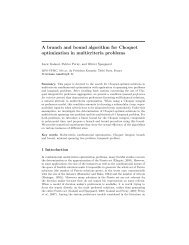
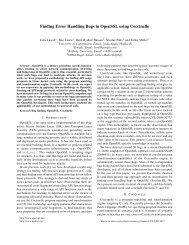
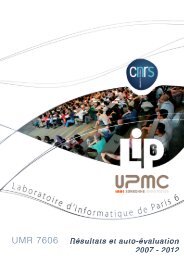

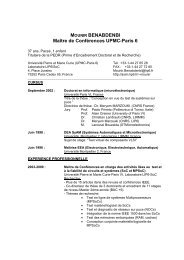
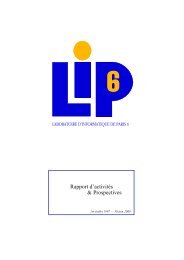
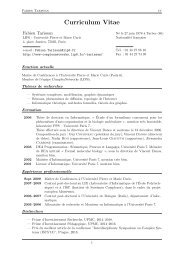

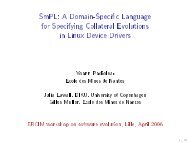
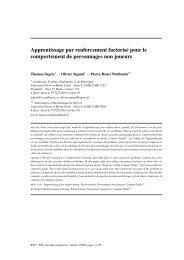
![Proceedings [PDF] - Measurement and Analysis of P2P Activity ...](https://img.yumpu.com/32964521/1/184x260/proceedings-pdf-measurement-and-analysis-of-p2p-activity-.jpg?quality=85)
